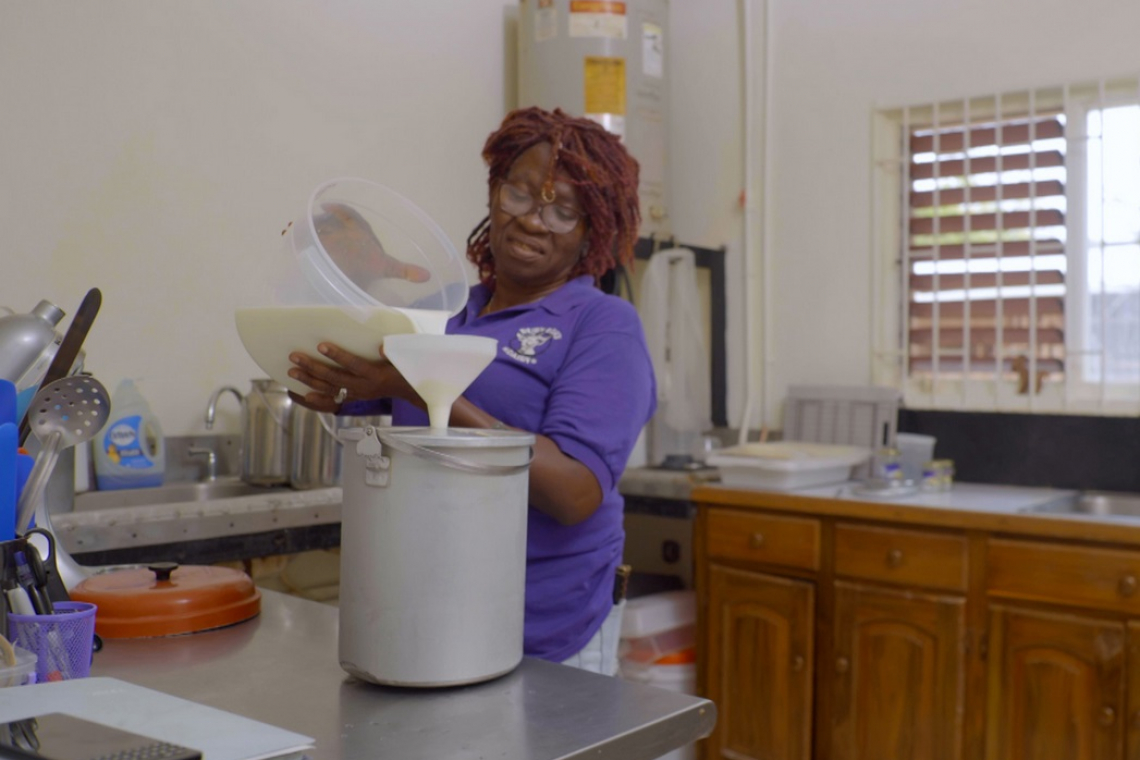KINGSTON, Jamaica--Goats are a common sight in Jamaica, roaming across fields, grazing along highways, and even traipsing about on city streets. They are prized for their meat, which is featured in curry goat and other popular dishes. Given the seeming ubiquity of the animals, it was initially perplexing to Americans Byron Walker and Ruth Mitchell that they could not find any goat dairy products in local shops. “We were like, what is wrong with this?” Mitchell says. “Where is the goat milk? Where is the goat cheese?”
The couple – frequent visitors to Jamaica over decades – came up with an unconventional retirement project that would keep them in Jamaica long-term: opening a goat dairy farm. Eight years later, they are leading a fledgling goat dairy movement in the country. Their business, with nine employees, sells products including milk, yogurt, and cheesecake to grocery stores, hotels, restaurants, and a loyal base of individual customers. It is called Ruby Goat Dairy – “Ru” for Ruth and “By” for Byron.
Demand far outstrips their capacity, so they are teaching other goat farmers how to collect milk, which Ruby Goat Dairy buys. It has supply arrangements with five farms. “I thought we would be hobby-sized and maybe gifting or selling to a small group of people with a dozen animals,” says Walker (72). “Both Ruth and I are professionally driven, I would say a little competitive, and consequently as the business began to grow, that was exciting all by itself.”
Before becoming goat farmers, Walker was a technology analyst on Wall Street, and Mitchell (70) worked as a nurse and managed home-health agencies. “We did not want to just sit under a palm tree and read books and sip rum drinks,” Mitchell says. “We needed to be productive.” They say some friends have called them “nuts” for choosing to go back to work, and in such physically demanding jobs.
To prepare for what she calls their second act, Mitchell took an internship with a goat farmer in Connecticut, where she learned to make cheese. Upon returning to Jamaica, the couple borrowed a goat from a farmer and started making cheese at home in Trelawny, on the northwest coast. “Most people are not making cheese in 85-degree weather with no air conditioning,” Mitchell says, “so that was a challenge to get the cheese to behave.” They have filled in gaps in their knowledge by getting advice from their veterinarian and other local farmers, reading books, and even watching YouTube videos.
The farm, where they keep about 45 goats, is an eight-minute drive from their home. Word has spread around the island about the business, whose products have caught on especially with people who are lactose-intolerant. “I have had total strangers on the streets of Kingston, which is the capital here, stop me and say, ‘are you the goat man?’” Walker says. “They will say, ‘I just want to thank you for what you are doing for Jamaica.’”
The couple’s success is leading other goat farmers to diversify their businesses into dairy products. Progress may require the help of breeding programmes to produce animals that are better suited for milk. “We can follow their lead,” says Trudy Wilson, co-owner of Cabra Ranch, one of Ruby Goat Dairy’s biggest suppliers. “They have definitely sparked an interest in a market that was almost non-existent.” ~ Bloomberg ~







